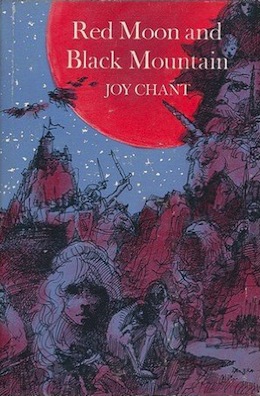Joy Chant’s Red Moon and Black Mountain is a wonderful portal story that would be classified as YA today. Three English children travel to a world of magic, where they have some quite trying adventures. The eldest boy, in particular, goes through the most difficult adventure most of us ever have: adolescence. But he does so in a horse-warrior tribe, where he is recognized as the saviour who will eventually defeat the Dark Lord in single combat.
Chant infuses these well-worn tropes with a sensitivity that elevates them to the very special. But while her imagery and narrative have faded in the two or three decades since I have read the book, the denouement remains fresh in my mind.
The boy learns to become a warrior, and Chant does not shy away from what it means to make a young man into a killer. Her narrative recognizes that her protagonists are children, a detail often overlooked in today’s hyper-violent, super-cynical stories. In the same vein she does not end the story after the expected conflict and victory over evil. Instead, the boy is left to find his own path; his true heroism must stem from within, rather than be directed by fates or gods.
In fantasy we are used to our characters being soundly abused. Savage combats and serious deprivation, often preceded, intermixed, and followed by scenes of torture. Perhaps worse is the psychological impact: constant fear, loss of loved ones (how many stories start with the hero or heroine’s entire family being brutally murdered?), the necessity of violence (often against innocent pawns), and on top of it all the fate of the world (usually literally) riding on their shoulders.
In real life our heroes would surely end as broken wrecks, with bodies permanently handicapped and minds equally fragile. Ordinary tasks, such as going to the grocery store, would become minefields of dangerously inappropriate but habitual responses. I remember the author of Maus talking about his father, a Holocaust survivor, trying to return half a box of cereal, for resale, since he didn’t want the rest—an action that made perfect sense in the harsh world he had survived, but in softer, civilized times was painfully out of place. How much more out-of-place would men and women be who had marched through Hell to destroy Death itself?
At the very end, when the children return home after their several-year sojourn, Chant writes a line that has stuck with me for decades. The gods are thanking the boy for his actions, and they say:
“Now we will show that we too can be generous. All that you have lost shall be restored, and all that you have gained remain untouched.”
The children are returned to their country garden, moments after having left, in the same clothes and bodies as before, and the same age. The boy we watched grow into a man with a terrible destiny has become a boy again, with no more physical scars than a dream would leave, but with all the wisdom that a life well-lived yields.
Isn’t this the essence of fantasy? Isn’t this why we read it? To be subject to terrible trials, to be forged on the anvil of fear and despair, to face down destruction and deal death in its turn – and yet, to return to our armchair, our library, our safe little worlds, without all the scars and damage that such events must necessarily engender.
To sum up the entire project of fiction in a sentence, and make it an integral part of the plot—that was awesome.
M.C. Planck is the author of Sword of the Bright Lady (World of Prime: Book 1) and The Kassa Gambit. After a nearly-transient childhood, he hitchhiked across the country and ran out of money in Arizona. So he stayed there for thirty years, raising dogs, getting a degree in philosophy, and founding a scientific instrument company. Having read virtually everything by the old Masters of SF&F, he decided he was ready to write. A decade later, with a little help from the Critters online critique group, he was actually ready. He was relieved to find that writing novels is easier than writing software, as a single punctuation error won’t cause your audience to explode and die. When he ran out of dogs, he moved to Australia to raise his daughter with kangaroos.










